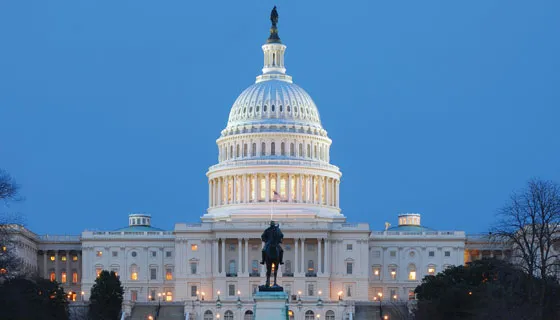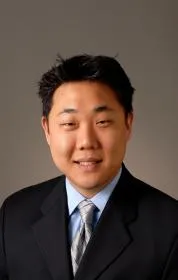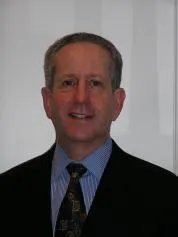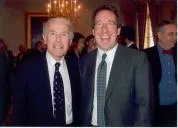Public Service on the Hill: Appointees in the Bush Administration

Politically appointed positions—they don’t pay terribly well, the hours are long, and the complaint factor is enormous, but these jobs provide unparalleled opportunities to make policy and effect change. Because so many graduates of the Law School have a keen interest in public service work, it is unsurprising that such positions in the federal government are well populated by University of Chicago Law School alumni. But as the Bush administration draws to a close, these attorneys are making every moment count.
“The opportunity to do something in an administration is a unique and powerful situation,” notes Paul Rosenzweig, ’86, Deputy Assistant Secretary for Policy at the Department of Homeland Security. “For most Americans, the only way they can make change in the government is with their vote. But I am at a point in the department where I get to create stuff, where I get to build a foundation and make things happen. The things I have done over the past three years have made the world a safer and better place.”
Of course, getting the political appointment is the necessary first step to working for the administration, and there are two key components to this task. First, candidates have to be very good at what they do. And second, they must know the right people.
“The key to getting one of these jobs is to have a good reputation for doing your job well,” says Deborah Garza, ’81, who is deputy assistant attorney general in the Antitrust Division at theDepartment of Justice. “And go in young—get a job in government and build from there. My first job was as a special assistant under Reagan, and as always, the people higher up were very attuned to who were the young, up-and-coming people. Remember,Washington is always focused on who is good and who has merit that they want to cultivate.
“It’s almost like there is a list somewhere for people in various areas who are in the Republican Party, and then you get asked to do jobs,” Garza continues. “I have never actually had to lobby for a job; I have always been asked.”
And having skills others do not is also helpful, explains Margaret Peterlin, ’00, who is the deputy undersecretary of commerce for intellectual property and the deputy director of the United States Patent and Trademark Office.
“I know how to sort the issues and figure out what the relevant question is that needs answering, what the problem is that needs solving,” Peterlin says. “And that is something the training at the University of Chicago has really helped me with. Because otherwise, there are a lot of lawyers finding solutions to the wrong things.”
But there is more than one route to a political appointment. “It’s very interesting that internationally, there is a very specific path to advancement, especially in places like Japan and France,” notes John Dudas, ’93, undersecretary of commerce for intellectual property and director of the United States Patent and Trademark Office. “But here there are all kinds of ways to move up, often in ways that cannot be anticipated. Often small things can end up making a difference and offering you huge opportunities.”
Unsurprisingly, one of the biggest parts of actually obtaining a politically appointed position is the vetting process. And, of course, the bigger the job, the more in-depth the investigation into a candidate’s life becomes. Dudas, whose position required Senate confirmation, found the process difficult.
“It was not fun, even though I ended up being approved unanimously by voice vote,” he says. “Everything and anything you’ve ever done in your entire life, any case you tried, every piece of financial information, is delved into. And then there are the things you don’t even think about initially that they end up questioning you about. Fortunately, in the end, it was worth it. But it was not fun.”
Not every candidate has such a smooth experience. Benton Campbell, ’91, has been the interim United States attorney for the Eastern District of New York since October 2007. In July, he was nominated by the president as U.S. attorney but has not yet been confirmed by the Senate.
“They may get to it, they may not, before the recess,” Campbell explains. “If they confirmme before the recess, Imay get to serve the usual four years, but then again, when a new president comes in—both Clinton and Bush did this—they may ask for everyone to resign. It’s all really unclear. If I don’t get confirmed and appointed, I can go back to my career job as an assistant United States attorney. Or, either way, I can go into private practice. It remains to be seen.”
Fortunately, most of the political appointees from the Law School do find their jobs to be both fun and challenging.
“Every day is so exciting, I just love it,” says Gerald Masoudi, ’93, chief executive council for the Food and Drug Administration. “There is so much to learn, so much to regulate, and not a day goes by that I don’t learn about a new legal issue and there are all these issues in the press, so it never gets dull. It’s also interesting because everything at the FDA is done through statutes, so it is very detailed and interesting because you have to dig through the various sections to find answers.
Troy Eid, ’91, the United States attorney for the District of Colorado, also extols the joys of his work. “In this job you absolutely live on the adrenaline of investigation,” Eid says. “Sometimes the most interesting cases can be where you don’t prosecute but you end up knowing things that are compelling and interesting. Because you have to remember that your duty in this job is not just to win convictions, it is to do justice.”
The responsibilities of those in politically appointed jobs are also somewhat different than those in career positions. “Although it is very political getting this job, the job itself is not political,” Eid explains. “My approach has been that you have to be prepared to be fired or to resign any day that you go in to work for a principle or simply because you don’t believe in the way a case is being handled. I am from Colorado and my heart is in Colorado and that is why I wanted to work here, but I had fierce disagreements with the previous attorney general. Although I was ultimately successful, I was willing to leave at any point.
“If you are not prepared to take another job, if you are not prepared to walk away, then you are not fit to be a U.S. attorney,” Eid continues. “You are signing up for a higher calling, you are working with life and death and the deprivation of people’s freedom. If you have an ethical disagreement and you are not willing to do something about it, then you don’t have any business trying to serve.”
Campbell similarly understands the importance of the job he performs. “This is a great job,” he notes. “Our dockets are full of narcotics-related crimes, violent crimes, gang issues, organized crime, and a lot of economic crimes—both corporate and securities related. It is our job to handle these cases fairly and intelligently, or we are just adding to the problem.”
Of course, political appointments are not necessarily an end unto themselves. Steven Duffield, ’99, leveraged his years as a policy analyst for Senate leaders into a variety of positions for the Republican Party, including positions as chief counsel and deputy staff director for the Republican Policy Committee. He recently completed his most recent position as executive director of the Republican Platform Committee.
“This job is the perfect blend of my background, because it is heavily policy based and messaging based, but it is so exciting,” Duffield explains. “The job itself is political in the sense of people management and getting important issues adopted with the least amount of grief. I really enjoy it.”
Still, working in a position with a finite term can be a bit anxiety producing. “When I took this job [I knew] it was finite,” Rosenzweig notes. “I believed everybody changes jobs these days, so it was no big deal and it was not terribly scary. After all, I have a unique skill set, and I should be able to find something I like. But now that I am five months away from being out of work, it is weighing on my mind a bit more.”
Regardless, some alumni, like Peterlin, have spent their whole careers in public service work. “When I graduated from college, I joined the [military], and I thought that would be my time in public service,” Peterlin explains. “That would be my way of giving back—of paying my debt to society. But I have been doing public service work now since 1993, so I guess my debt to society must be huge! But it really has been great because of the wonderful opportunities I have had to do really interesting work.”
Appointees take comfort in knowing that many options are available, in the public and the private sectors. And many have worked repeatedly in both. “I have been back at the FTC three times,” Garza says. “They are going to put barbed wire up soon to keep me out. Even though we leave for the private sector, we are always interested in coming back.We sound like groupies, and it is because it is public service work and the staff is wonderful and you are working with all these wonderful, committed, talented people. It is just such an honor to get to do this at all."


